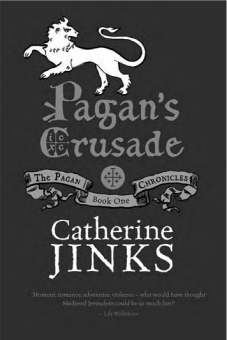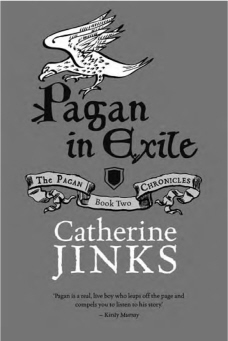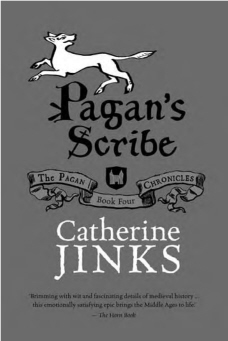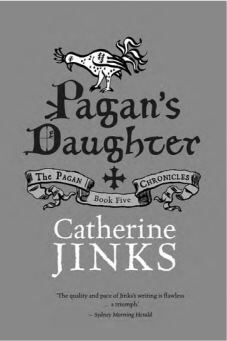Pagan's Vows (27 page)

Are they here for my sake? I suppose they are. Durand’s crying; his nose is running; he looks terrible. He darts forward – hugging me – and I can feel his tears on my neck.
‘I’ll miss you,’ he sobs. ‘I’ll miss you, Pagan.’
Oh God. How can this be happening? And Gaubert, little Gaubert. I have to bend over to embrace him. He feels so delicate, like a bird.
‘Goodbye, Pagan.’ His voice quavers. ‘Come back soon.’
I think I’m going to break, but no – no I’m not. Because here’s Bernard, and he hates me now; he blames me for everything that happened to Raymond. He can’t even bring himself to touch me.
‘Goodbye,’ he says. And good riddance: the unspoken words are clear in his eyes.
Forgive me, Bernard. Forgive me for what I’ve done to you.
‘Take care of yourself.’ It’s Amiel. Exhausted, ghostly, his touch as weak as a butterfly’s. This may be the last time I see him; he may not live much longer. But what can I say? If I speak, it will be the end. I’ll be finished. And I can’t risk that.
Moving from Amiel to Gaucher. Never liked Gaucher. Glad to see the back of him. Perfunctory hug . . . and here’s Ademar. Ademar? It can’t be. Stopping to stare at him. He stares right back. Doesn’t have to say or do anything. Just the fact that he’s come – I still don’t believe it.
And Clement’s next in line.
Clement, leaning against the olive tree. (He’s propped his stick against the wall.) But he pushes himself upright, and takes a step forward. Holds out his arms. I can see over his shoulder; I can feel his bones grinding as he squeezes, as he staggers, using my weight to support himself. His harsh breathing. His voice in my ear – my right ear.
‘Make me proud,’ he mumbles. ‘Make me even prouder.’ He pulls back, and raises his clumsy, swollen hands until I can feel them on my face, one on each cheek, and he bends down and kisses my forehead. Kisses it hard.
Sweet Jesus.
The tears; they’re coming. I can’t stop them now. I can’t see and I can’t breathe, and if I breathe, I’ll howl. I’ll collapse. Someone’s hand on my arm. ‘Come on, Pagan.’ How can this be happening? How did I get all these friends? And Clement – Clement never told me –
Through a door. Gravel underfoot. Stables and horses, three horses, and the abbot’s on one of them, dressed for riding. Good horses. Big horses. The second one’s a bay gelding, with a servant in the saddle.
The third one must be mine.
‘Pagan?’ It’s Roland’s voice. No, I can’t. I can’t leave him.
‘I can’t leave you . . .’
Bawling like a baby. God, oh God, this is unbearable. But he’s still there, all warm and solid, his arms and his chest and his back, stooping now, so he can lay his cheek against my head. So I can lay my head against his heart. Holding him tight, because soon I’ll be gone.
Roland. My mother and my father. My friend. My lord.
Help me. Please help me to leave you.
‘You’ll be all right,’ he says softly.
‘I can’t – I can’t –’
‘Yes you can. You can do anything. Everything.’ He swallows; I can feel it shuddering down his throat and into his chest. ‘Don’t make this any harder, Pagan, please. The abbot is waiting.’
The abbot. Yes. The abbot is waiting. Can’t let the abbot wait. Releasing my grip; turning blindly towards where the horses were, before I drowned them in a flood of tears. No – hold on – I can see them, again. And I can see the abbot, too: he’s gazing politely off into the distance.
While his servant gawks at us like an owl.
‘I’ll help you up,’ says Roland.
Owl-eyes is holding my horse, but he surrenders the reins to Roland, who flicks them back over the long, snowy neck where they’re supposed to be.
‘Put your arm across my shoulders, Pagan, and I’ll lift you. No – no, put your foot there. That’s it. That’s right. Be careful. Good.’
A struggle; a stagger; a jerk of the reins. And suddenly I’m up. I’m up! Now I just have to ride the damned thing.
How long has it been since I sat on a horse?
‘This is an extremely placid animal,’ the abbot assures me. He looks very organised: riding gloves, riding boots, saddlebags with his initials on them. ‘Even one-handed, you’ll be able to ride her. All she does is follow the horse in front.’ He glances at Roland, grimaces, and turns away. ‘We have to go, now,’ he says.
Owl-eyes clicks his tongue. The abbot digs in his heels. They’re both moving. They’re both going.
Roland is still holding my reins.
‘Roland –’
‘Pray for me. Think of me.’ He grabs my good hand, and presses it to his lips. He folds my fingers around the reins. He steps back. ‘I’ll see you again,’ he says, and slaps the white crupper in front of him.
With a snort and a shiver, my horse begins to move. It begins to follow the big, brown backside in front of it, heading for the abbey gates. It feels so peculiar. So high and unsteady and – and –
Twisting in my saddle, but Roland’s already turned his back. He’s turned his back, and he’s walking towards the herb-garden wall. No, he’s not going in there. He’s going somewhere else. Why doesn’t he look? Why doesn’t he wave? But before we turn the corner, I can see him stop.
He stops, and covers his face with his hand.
Oh Roland. Oh Roland. Now he’s out of sight, and we’re passing the dormitory. Passing the guest-house. Coming up to the gates. The gates! Watching the porter, as he lifts his hand to us. Under the archway, from shadow into sunlight.
Through the gates.
I’m through the gates, now. I’ve left them behind. I’m outside the abbey, for the first time in eight months: there are the fields, and the trees, and the road unrolling before me. And there, near the wall, sitting on a rock – it’s Saurimunda.
She looks up. Her mouth drops open. She scrambles to her feet and stretches out her hands, but I’m already passing. I can’t stop, I can’t help. I can’t even smile, because her face is breaking my heart.
Straining back over my shoulder, to watch her receding form. A drab little patch against the stonework. Beside her, the solid, grey weight of the gate-house, with its tiny windows and its crenellated towers. And its cross. And its carvings.
And its massive wooden gates, slowly shutting behind me.

S
HORTLISTED FOR THE
C
HILDREN’S
B
OOK
C
OUNCIL OF
A
USTRALIA
B
OOK OF THE
Y
EAR
A
WARD
(O
LDER
R
EADERS) AND THE
V
ICTORIAN
P
REMIER’S
L
ITERARY
A
WARDS
(C
HILDREN’S
L
ITERATURE
)

‘Shrewd and scrappy, with an instinct for self-preservation and a strong sense of loyalty, Pagan Kidrouk makes an engaging and spirited narrator. From the beginning of
Pagan’s Crusade
, I found myself plunged into the thick of medieval Jerusalem, meeting a host of intriguing characters … A grand adventure!’
N
ANCY
B
OND
, author of
A String in the Harp
, a Newbery Honor Book


‘The setting is medieval, but the issues addressed have twenty-first century parallels This reviewer cannot remember a more compelling or rewarding page turner. Jinks’s writing is a tour de force of young adult prose. Happy are they who read and introduce young readers to Pagan.’
Voice of Youth Advocates

W
INNER OF THE
V
ICTORIAN
P
REMIER’S
L
ITERARY
A
WARDS
(C
HILDREN’S
L
ITERATURE
)

‘No question about it, Catherine Jinks loves both Pagan and Lord Roland Roucy de Bram, the Knight Templar whom Pagan follows through the siege of Jerusalem, back to France and on into the Abbey of Saint Martin. Her delight in Pagan blazes through every sentence of his slangy, racy,
irreverent, witty first person narrative ...’
J
ENNY
P
AUSACKER
,
Viewpoint
